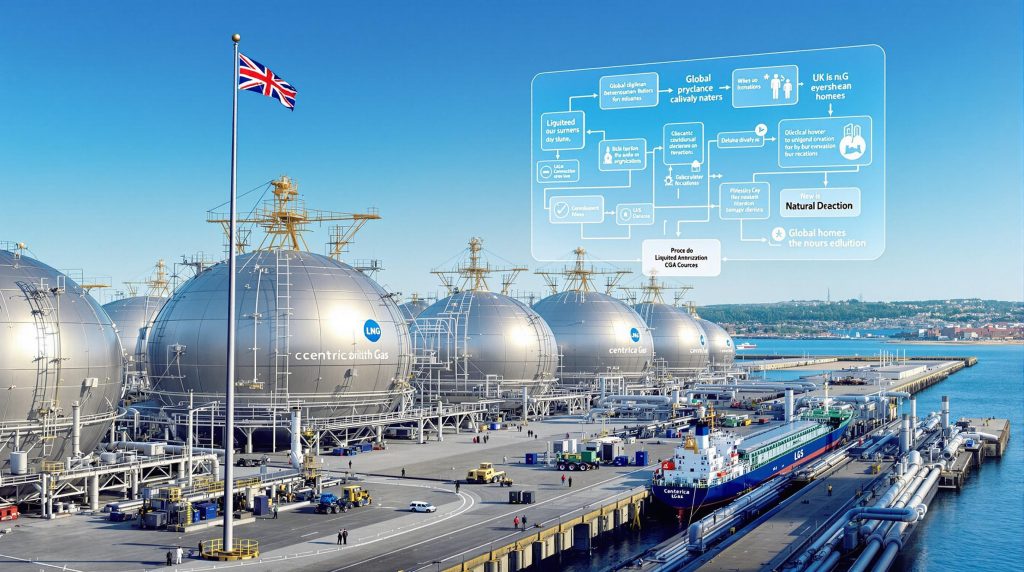Centrica's $2 Billion Acquisition of UK's Largest LNG Import Terminal: Strategic Implications
The UK energy landscape is experiencing a significant shift as Centrica, the parent company of British Gas, has acquired the UK's largest liquefied natural gas (LNG) import terminal in a landmark $2 billion deal. This strategic move strengthens Centrica's position in the energy market while bolstering the nation's energy transition strategies during a period of global supply chain volatility.
This acquisition represents a pivotal moment for both Centrica and the UK energy sector, with far-reaching implications for market competition, consumer prices, and national energy resilience. Let's explore the strategic significance and potential impacts of this major infrastructure investment.
Strategic Significance of Centrica's LNG Terminal Acquisition
Centrica's acquisition of the UK's largest LNG import terminal marks a watershed moment in the company's evolution from a traditional retail energy supplier to a vertically integrated energy powerhouse. The $2 billion investment demonstrates Centrica's commitment to securing direct access to global gas markets at a time of unprecedented energy volatility.
The terminal's strategic importance cannot be overstated. With UK North Sea gas production declining by approximately 7% annually over the past decade according to the UK Continental Shelf Transition Authority, import infrastructure has become increasingly vital to national energy security. In 2022 alone, the UK imported 47.8 billion cubic meters (bcm) of gas, with LNG accounting for 22.1 bcm of that total.
This vertical integration strategy gives Centrica unprecedented control over its supply chain, potentially creating efficiencies that could benefit its approximately 12 million customer accounts across the UK. By eliminating intermediaries in the gas import process, the company positions itself to better manage price volatility while strengthening the UK's energy resilience.
"Securing direct access to global LNG markets provides both commercial advantages and contributes to national energy security priorities," noted energy policy experts reviewing the transaction. "This type of vertical integration can create significant operational efficiencies in volatile market conditions."
Transformation of Centrica's Market Position
Expanding Beyond Retail Energy Supply
This acquisition fundamentally transforms Centrica's business model, moving the company beyond its traditional role as Britain's largest energy supplier. With revenues of £29.9 billion in 2023, Centrica already wields significant market influence, but this infrastructure investment represents a strategic pivot toward controlling critical points in the energy value chain.
By acquiring key import infrastructure, Centrica gains greater control over gas sourcing, storage, and distribution—creating a more integrated business model that reduces dependency on third-party infrastructure. This shift mirrors similar moves by European energy majors who have increasingly sought to secure strategic assets across the supply chain.
Securing Direct Access to Global LNG Markets
The LNG terminal acquisition gives Centrica privileged access to the global LNG market at a critical time. Global LNG trade reached 397 million tonnes in 2022, growing 5.8% from the previous year according to the International Gas Union's World LNG Report. With direct terminal access, Centrica can source LNG from diverse global suppliers including Qatar, the United States, and Australia.
This diversification of supply sources is particularly valuable as European LNG imports surged by 60% in 2022 compared to 2021, reflecting the continent's accelerated shift away from pipeline gas dependency. Centrica's terminal acquisition positions the company to capitalize on these shifting trade patterns while potentially securing more competitive pricing for UK consumers.
Strengthening UK Energy Security Credentials
By taking ownership of this strategic asset, Centrica positions itself as a key player in the UK's energy security framework. The terminal's substantial storage and regasification capacity provides a crucial buffer against supply disruptions and seasonal demand fluctuations.
This is particularly important given that winter gas demand in the UK typically runs 3-4 times higher than summer levels according to National Grid ESO data. The storage capacity inherent in LNG terminal operations allows Centrica to build reserves during lower-demand periods, enhancing system resilience during consumption peaks.
Technical Details of the LNG Terminal Acquisition
Terminal Specifications and Capacity
The LNG import terminal represents critical infrastructure with substantial regasification and storage capabilities. While specific capacity details await confirmation from regulatory filings, the UK's largest terminals typically handle several billion cubic meters of gas annually.
The terminal's strategic location enables it to receive shipments from the world's major LNG exporters, providing crucial supply diversity. Modern LNG terminals incorporate advanced technologies for efficient offloading, storage in cryogenic tanks at -162°C, and regasification processes that convert the liquefied gas back to its gaseous state for distribution through the national transmission system.
Investment Value and Financial Structure
The $2 billion transaction ranks among the largest energy infrastructure deals in the UK in recent years, reflecting both the strategic importance of the asset and Centrica's financial confidence. This substantial investment demonstrates the company's long-term outlook on natural gas remaining a crucial component of the UK energy mix despite the ongoing transition to renewables.
For context, the UK has four operational LNG import terminals: Isle of Grain, South Hook, Dragon LNG, and Teesside GasPort. These facilities represent strategic national infrastructure with combined import capacity of approximately 48 billion cubic meters per year.
Operational Integration Timeline
Centrica plans to integrate the terminal into its existing operations through a phased approach, with full operational control expected by early 2026. This measured integration strategy aims to ensure continuity of service while implementing enhanced operational systems and commercial strategies.
The integration process will likely involve significant technological upgrades to terminal management systems, allowing for greater operational efficiency and coordination with Centrica's trading and supply functions. This gradual approach reflects the critical nature of the infrastructure and the need to maintain uninterrupted service during the transition period.
The Growing Importance of LNG Infrastructure in the UK
Declining North Sea Production
The UK's domestic natural gas production has been on a steady downward trajectory, with North Sea output declining by approximately 7% annually over the past decade. This declining domestic production has transformed the UK from a net gas exporter to a significant importer, with imports now accounting for approximately 50% of UK gas supply.
This fundamental shift in the UK's energy balance has elevated the importance of import infrastructure. LNG terminals provide crucial flexibility in sourcing gas from diverse global suppliers rather than relying solely on pipeline connections, which are often subject to regional geopolitical tensions and trade war implications.
Energy Transition Considerations
Despite the UK's ambitious Net Zero Strategy, which aims for 95% low-carbon electricity by 2030, natural gas remains an essential transition fuel. Current projections indicate that gas will continue to provide 20-35% of UK electricity generation through 2035, according to the UK Government Energy White Paper.
As the UK energy system deputy head noted in a recent industry forum: "Gas will continue to play an important role as a transition fuel while we scale up renewable generation." LNG infrastructure serves as a bridge technology, supporting energy security while renewable capacity continues to grow and energy storage solutions mature.
Seasonal Demand Fluctuations
The UK experiences dramatic seasonal variations in gas consumption, with winter demand typically 3-4 times higher than summer levels. This cyclical pattern creates significant challenges for energy system management and supply security.
LNG terminals with storage capabilities help manage these fluctuations by allowing gas to be imported and stored during periods of lower demand or favorable pricing. This flexibility is particularly valuable given the volatility in global energy markets, providing a buffer against both price spikes and physical supply constraints.
Global Context and Market Trends
Part of Broader Industry Consolidation
Centrica's acquisition aligns with a global trend of energy companies securing strategic infrastructure assets. Similar transactions have occurred across Europe as energy firms adjust to evolving market dynamics and supply security concerns.
For instance, TotalEnergies has acquired stakes in several LNG terminals globally in recent years as part of its strategy to strengthen its position in the LNG value chain. This consolidation trend reflects the industry's recognition of the strategic value of controlling key infrastructure nodes.
Response to Changing Trade Patterns
Global LNG trade flows have undergone significant transformation in recent years. The emergence of the United States as a major LNG exporter, alongside Australia's expanded production capacity, has fundamentally altered traditional market dynamics. These changes have created both challenges and opportunities for major energy companies.
Owning import infrastructure gives Centrica greater flexibility to adapt to these evolving trade patterns. The company can negotiate directly with a diverse range of global suppliers, potentially securing more competitive terms than would be possible through intermediaries or spot market purchases.
Balancing Energy Security and Decarbonization
Energy companies worldwide face the dual challenge of maintaining energy security while transitioning toward lower-carbon operations. LNG infrastructure investments represent a pragmatic approach to this transition, recognizing that while renewable energy capacity continues to grow, natural gas remains necessary for system stability and peak demand management.
The UK's own energy strategy acknowledges this reality, noting that gas infrastructure investments can complement rather than conflict with decarbonization goals when properly managed. Gas-fired power generation remains less carbon-intensive than coal alternatives, potentially serving as an emissions reduction measure in certain contexts.
Market Implications of Centrica's Strategic Move
Impact on UK Gas Pricing
Centrica's expanded role in gas imports could influence domestic gas pricing dynamics. The company's vertical integration may create efficiencies that could be passed on to consumers, though this will depend on both market conditions and tariff impact analysis.
With average UK household gas bills currently at £1,568 annually under the Ofgem price cap, any potential impact on consumer pricing will be closely scrutinized by both regulators and consumer advocates. The acquisition's ultimate effect on retail prices will depend on how Centrica leverages its strengthened market position.
Competition Considerations
The acquisition significantly enhances Centrica's market position, potentially raising questions about market concentration. The UK gas supply market is already relatively concentrated, with the top six suppliers serving approximately 80% of domestic customers according to Ofgem Market Minder data.
This transaction will likely undergo thorough review by the Competition and Markets Authority, which examines energy acquisitions above certain thresholds under the Competition Act 1998. The regulatory approval process may include conditions designed to prevent adverse effects on market competition.
Investment Signal to the Market
This major infrastructure investment sends a strong signal about Centrica's confidence in the long-term role of natural gas in the UK energy mix. Despite ambitious decarbonization targets, the company clearly views gas as a crucial component of Britain's energy future for decades to come.
This positioning may influence other market participants' investment decisions in related infrastructure. The substantial financial commitment to gas import capacity could prompt similar strategic moves by competitors seeking to secure their position in the evolving energy landscape.
Consumer Impacts and Considerations
Potential Price Stability Benefits
By securing direct access to global LNG supplies, Centrica may be better positioned to manage price volatility, potentially offering more stable pricing to its retail customers during market disruptions. This could be particularly valuable given the extreme price fluctuations seen in European gas markets in recent years, with TTF gas prices ranging from €15-200/MWh in 2022 alone.
The potential for improved price stability would be especially significant for vulnerable consumers who have been disproportionately impacted by energy price volatility. However, any such benefits would need to be balanced against the risk of reduced competition if Centrica's market power increases substantially.
Enhanced Supply Security
The acquisition strengthens the UK's overall gas import capacity, reducing the risk of supply shortages during peak demand periods or international supply disruptions. This improved security benefits all UK energy consumers, not just Centrica's direct customers.
This enhanced security dimension carries particular significance in the context of recent global supply chain disruptions and geopolitical tensions affecting energy markets. The ability to source LNG from diverse global suppliers provides valuable resilience against regional supply constraints.
Long-term Market Structure Implications
The vertical integration of a major energy supplier with key import infrastructure could reshape market dynamics in the UK energy sector. This structural change may influence competition patterns, pricing mechanisms, and service offerings across the industry.
Consumer advocacy groups will likely monitor these developments closely, particularly regarding potential impacts on market competitiveness and the pass-through of any efficiency gains to end users. The long-term consumer impact will depend significantly on the regulatory framework applied to this newly integrated operation.
Challenges and Regulatory Considerations
Regulatory Scrutiny and Approval Process
The size and strategic importance of this acquisition will attract significant regulatory attention. Centrica may need to address competition concerns and potentially offer concessions to secure final approval from both competition authorities and energy regulators.
The approval process will likely examine market concentration effects, potential barriers to entry for competitors, and implications for consumer choice and pricing. Given the terminal's classification as critical national infrastructure, national security considerations may also factor into the regulatory review.
Market Volatility Management
Global LNG markets have experienced extreme price volatility in recent years, creating both opportunities and risks for major market participants. Centrica will need sophisticated risk management strategies to navigate these fluctuations while maintaining competitive retail pricing.
The company's ability to effectively hedge against price volatility while leveraging its strengthened market position will be crucial to realizing the potential benefits of this vertical integration. This challenge is particularly acute given the ongoing geopolitical tensions affecting global energy markets.
Balancing Commercial and National Interest Roles
As the owner of critical national infrastructure, Centrica will need to balance its commercial objectives with broader energy security responsibilities. This dual role may subject the company to greater public and political scrutiny regarding operational decisions and investment priorities.
This balancing act reflects the unique position of energy majors operating essential infrastructure in liberalized markets—facing commercial pressures while also bearing significant responsibility for system reliability and national security concerns.
Alignment with UK Energy Strategy
Reinforcing Energy Security Priorities
The UK government has emphasized energy security as a key priority following recent global supply disruptions. Centrica's investment aligns with this focus by strengthening domestic import capacity under the control of a UK-based energy major.
This alignment with national policy priorities may facilitate regulatory approval, particularly if Centrica can demonstrate how the acquisition enhances system resilience and supply diversity. The transaction comes at a time of heightened government focus on critical infrastructure ownership and control.
Supporting Transition Fuel Requirements
While the UK pursues ambitious renewable energy targets, natural gas remains an essential transition fuel. Current projections indicate that gas will continue to provide 20-35% of UK electricity generation through 2035, highlighting its ongoing importance in the energy mix.
This acquisition helps ensure adequate gas supplies during the multi-decade transition to a low-carbon energy system. The infrastructure investment reflects the reality that even as renewable capacity grows, flexible gas generation remains necessary for system stability and peak demand management.
Diversifying Supply Sources
LNG terminals enable the UK to access gas from a wider range of global suppliers, reducing dependency on any single source or route. This diversification strategy represents a cornerstone of national energy security planning, particularly important given regional geopolitical tensions affecting traditional pipeline supply routes.
The terminal's capacity to receive shipments from major LNG exporters including Qatar, the United States, and Australia creates valuable supply optionality. This flexibility enhances both commercial negotiating leverage and physical supply security.
Key Questions About the Acquisition
Will this acquisition affect consumer gas prices?
While the acquisition could potentially lead to more stable pricing through vertical integration efficiencies, the impact on consumer prices will depend on multiple factors. These include global market conditions, regulatory oversight, and Centrica's pricing strategy.
The Competition and Markets Authority will likely examine potential consumer impacts as part of its review process. Any approval may include conditions designed to ensure that efficiency gains are appropriately shared with consumers rather than captured entirely as increased profit margins.
How does this purchase affect the UK's energy security?
The acquisition strengthens UK energy security by ensuring continued operation of critical import infrastructure under a major UK energy company. This may improve coordination during supply emergencies and enhance system resilience against both physical supply disruptions and market volatility.
The transaction comes at a time when energy security concerns have risen to the top of government priorities, potentially aligning corporate strategy with national policy objectives. The terminal's role in providing supply diversity and flexibility represents a valuable contribution to system resilience.
Does this investment conflict with decarbonization goals?
Natural gas, while a fossil fuel, produces lower emissions than coal when used for electricity generation and can potentially support renewable integration through flexible generation. The investment may therefore be compatible with decarbonization if it displaces higher-carbon alternatives in the near term.
The UK's own energy strategy acknowledges the continued role of natural gas during the transition period, with gas projected to remain a significant part of the energy mix through at least 2035. This recognition of gas as a transition fuel provides context for Centrica's investment decision.
What percentage of UK gas imports will Centrica now control?
The exact percentage will depend on utilization rates and market conditions, but the acquisition significantly increases Centrica's role in the UK gas import market. With UK LNG imports accounting for 22.1 bcm in 2022, control of the largest terminal would give Centrica influence over a substantial portion of national gas imports.
This increased market share will likely be a key focus of regulatory review, particularly regarding potential impacts on competition and market functioning. The regulatory approval process may include measures to ensure appropriate market access for other participants.
Looking Ahead: The Future of UK Energy Infrastructure
As the UK continues its energy transition journey, strategic infrastructure investments like Centrica's LNG terminal acquisition will play a crucial role in balancing immediate energy security needs with longer-term decarbonization goals. The transaction represents a significant vote of confidence in natural gas as an enduring component of the UK energy landscape despite the accelerating shift toward renewable generation.
For energy consumers, infrastructure investments of this magnitude have implications that extend far beyond short-term pricing impacts. By strengthening supply chain resilience and improving import flexibility, such acquisitions can
Searching for the Next Major Mineral Discovery?
Discover how historic ASX mineral discoveries have generated substantial returns by exploring Discovery Alert's dedicated discoveries page, where the proprietary Discovery IQ model transforms complex mineral data into actionable insights for investors. Begin your 30-day free trial today at https://discoveryalert.com.au/discoveries/ to position yourself ahead of the market.




